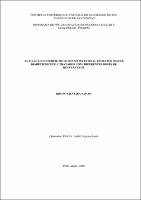| Share record |


|
Please use this identifier to cite or link to this item:
https://tede2.pucrs.br/tede2/handle/tede/7076| Document type: | Dissertação |
| Title: | Avaliação do perfil microbiano intestinal em ratos Wistar diabéticos tipo 1 tratados com diferentes doses de Resveratrol |
| Author: | Adami, Bruno Silveira  |
| Advisor: | Souto, André Arigony |
| Abstract (native): | Os estudos sobre resveratrol têm aumentado de forma notável nos últimos anos. Este aumento está diretamente relacionado com a versatilidade do composto, popularmente conhecido em decorrência aos benefícios do vinho. Contiguo ao resveratrol, outro assunto crescente na comunidade científica é a microbiota e sua possível modulação através de compostos com ação prebiótica. Sabendo-se que o resveratrol ainda não tem um mecanismo de ação consolidado e, que grande quantidade do composto fica retida no trato gastrointestinal. O presente trabalho avaliou a influência da ingestão de resveratrol e, seu metabólito, dihidroresveratrol, em populações bactérianas especificas. Para a indução da disbiose intestinal, foi utilizado um modelo experimental de diabetes tipo 1 em ratos. O tratamento com resveratrol foi realizado durante trinta dias, com doses diárias de 5, 10 e 20 mg.kg-1. A quantificação dos metabólitos de resveratrol foi realizada através de UPLC-MS / MS (Ultra-Performance Liquid Chromatography-lectrospray Tandem Mass Spectrometry). A quantificação da A. muciniphila, Bacteroidetes e Prevotella ocorreu através de qPCR (Reaction Polimerase Chain). O estudo demonstrou aumento na população de A. muciniphila, Bacteroidetes e Prevotella tanto em ratos normais, quanto em animais diabéticos trados com resveratrol. Este aumento demonstrou uma resposta não linear. O metabólito apresentou uma produção dependente da dose, no entanto, foi observado um aumento significativo nos animais saudáveis em relação aos ratos diabéticos. Observaram-se também diferentes correlações entre as Bactérias e o metabolito do resveratrol em animais saudáveis e diabéticos. Em suma, o presente estudo demonstra que o tratamento com resveratrol promove alterações na microbiota. Foi observado aumento de populações bacterianas importantes para a saúde intestinal, como: A. muciniphila, Bacteroidetes, em ratos Wistar saudáveis e diabéticos, de maneira não linear. |
| Abstract (english): | The number on the citations of resveratrol has been increased over the last decade. This increase is directly related to the versatility of compound, commonly known by the benefits of wine. Contiguous to resveratrol, another growing issue in the scientific community is the microbiota and its possible modulation by compounds with prebiotic action. It is well know that resveratrol does not have a consolidated mechanism of action, and large amounts of the compound are retained in the gastrointestinal tract, we analyze the influence of resveratrol ingestion and their metabolite in populations of specific bacteria. For the induction of intestinal dysbiosis, we used experimental model of type 1 diabetes in rats. The treatment with resveratrol was performed during thirty days with daily doses of 5, 10 and 20 mg.kg-1. The quantification of the metabolite and resveratrol was accomplished through UPLC-MS/MS (Ultra-Performance Liquid Chromatography-Electrospray Tandem Mass Spectrometry). Quantification of A. muciniphila, Bacteroidetes and Prevotella was carried out by qPCR (Polymerase Chain Reaction). The study demonstrated increased population of A. muciniphila, Bacteroidetes and Prevotella in both normal and diabetic rats trated with resveratrol. This increase presented nonlinear response. The metabolite production was dose-dependent, however, a significant increase was observed in healthy animals compared to diabetic rats. We also observed significantIt is also observed correlation between different bacteria and resveratrol metabolite in healthy and diabetic animals. In conclusion, our study show that treatment with resveratrol promote changes in the microbiota. Data also reveled an increase in bacterial populations very important for intestinal health, such as: A. muciniphila, Bacteroidetes in healthy and diabetic Wistar rats in nonlinear manner. |
| Keywords: | METABOLISMO GENÉTICA DIABETES BIOLOGIA MOLECULAR BIOLOGIA CELULAR |
| CNPQ Knowledge Areas: | CIENCIAS BIOLOGICAS::BIOLOGIA GERAL |
| Language: | por |
| Country: | Brasil |
| Publisher: | Pontifícia Universidade Católica do Rio Grande do Sul |
| Institution Acronym: | PUCRS |
| Department: | Faculdade de Biociências |
| Program: | Programa de Pós-Graduação em Biologia Celular e Molecular |
| Access type: | Acesso Aberto |
| URI: | http://tede2.pucrs.br/tede2/handle/tede/7076 |
| Issue Date: | 29-Feb-2016 |
| Appears in Collections: | Programa de Pós-Graduação em Biologia Celular e Molecular |
Files in This Item:
| File | Description | Size | Format | |
|---|---|---|---|---|
| DIS_BRUNO_SILVEIRA_ADAMI_COMPLETO.pdf | Texto Completo | 3.53 MB | Adobe PDF |  Download/Open Preview |
Items in DSpace are protected by copyright, with all rights reserved, unless otherwise indicated.




